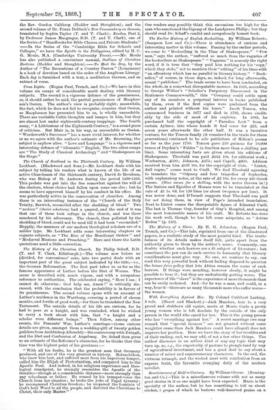The Earlier History of English Bookselling. By William Roberts. (Sampson
Low and Co.)—There is abundance of curious and interesting matter in this volume. Passing by the earlier periods, we come to " Bookselling in the Time of Shakespeare." " Few men," says the author, " suffered so much from the vagaries of the booksellers as Shakespeare." " Vagaries " is scarcely the right word, if it is true that "they paid him nothing for his copy,' which they stole," not to mention their "editing" of his lines with "an effrontery which has no parallel in literary history." " Book- seller," of course, in those days, as, indeed, for long afterwards, meant "publisher." The trade seems to have been conducted, on the whole, in a somewhat disreputable manner. In 1625, according to George Wither's " Scholler's Purgatory Discovered in the Stationers Commonwealth," this "Company could settle upon any of its members a perpetual interest in books published by them, even if the first copies were purloined from the author and printed without his leave." Jacob Tonson, who commenced business in 1677 and died in 1736, shows credit- ably by the side of most of his confreres. In 1683, he purchased half the copyright of " Paradise Lost " from a, certain Aylmer, into whose hands it had come for £25, and seven years afterwards the other half. It was a lucrative venture, for the Tonson family (it remained in the trade for three generations) continued to be sole publishers of Milton's poems as far as the year 1750. Tonson gave 250 guineas for 10,000 verses of Dryden's " Fables " (a fraction more than a shilling per line). Some interesting facts are given about his editions of Shakespeare. Theobald was paid £652 10s. for editorial work ; Warburton, .2.500; Johnson, £475; and Capell, £300. Addison received from him £107 10s. for the copyright of Cato. " Lintot, dull rogue," comes next to Curll. We find Theobald agreeing to translate the " Odyssey and four tragedies of Sophocles, with explanatory notes, at the rate of £2 10s. for every 450 Greek verses. (Nine verses for a shilling, with the notes thrown in !) The Satires and Epistles of Horace were to be translated at the rate of £1 1s. 6d. for 120 lines (or about twopence per line). It was never done, and D'Israeli suggests that Theobald was paid for not doing them, in view of Pope's intended translation.
Next to Lintot comes the disreputable figure of Edmund Cull. The last is Thomas Guy, founder of Guy's Hospital, and among the most honourable names of his craft. Mr. Roberts has done his work well, though he has left some misprints, as " Astrae Redux " (p. 110).






































 Previous page
Previous page